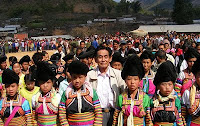Burma’s Future Hangs on the Suu Kyi Trial Verdict
By YENI
The Irrawaddy News
Unless the trial of Aung San Suu Kyi is again adjourned, a verdict will be given on Tuesday. It will demonstrate how the Burmese regime responds to calls by the people of Burma and the international community for an urgent start national reconciliation.
Suu Kyi faces a sentence of up to five years’ imprisonment if convicted of violating the terms of her house arrest by sheltering the American John Yettaw after he entered her home illegally in May. Her trial has dragged on for three months while the US, European governments and the Association of Southeast Asian Nations (Asean) have all called for her release.
In one of the most recent appeals, UN Secretary-General Ban Ki-moon last week urged the junta to free all political prisoners, including Suu Kyi, after convening a meeting of the "Group of Friends" of Burma. The group consists of 15 countries—Burma's neighbors, interested Asian and European nations, and the five permanent UN Security Council members, the US, Russia, China, Britain and France.
"I expect that the authorities of Myanmar [Burma] will respond positively and in a timely manner to the expectations and concerns and repeated calls of the international community to release all political prisoners and particularly Daw Aung San Suu Kyi," Ban told reporters.
However, on the eve of Suu Kyi’s “judgment day,” there is no sign of a change of heart by the generals.
Security forces have been deployed increasingly on the streets of the old capital, Rangoon, since the trial began. Over the weekend, the state-controlled media warned that the junta may be preparing a significant crackdown.
"Demanding [the] release of Daw Suu Kyi means showing reckless disregard for the law," said a commentary in the state-run English-language newspaper, New Light of Myanmar.
But the constant postponements in the trial may be a signal that the junta is at least examining the consequences of possible domestic and international anger if a tough verdict is handed down. As The Irrawaddy reported on Monday (The Irrawaddy online: “Regime Reportedly Divided over Suu Kyi Sentence”), sources within the Burmese army are also saying the delays are caused by disagreements within the military regime over how severely to punish her.
Whatever the court decides on Tuesday, the Burmese military leaders need to find a way to release Suu Kyi and to start immediately a political dialogue with the opposition for the sake of the country.
A recent suggestion by Singapore's Senior Minister Goh Chok Tong offers food for thought. Fielding questions at a luncheon conference on Asia-Middle East engagement with editors and senior journalists from Southeast Asia, the Middle East, China and India last week, Goh said: "Leadership is important, law and order, a pro-business environment; work out the necessary strategy for Myanmar. If it pursues the right path, the right economic policies, in 10 years, you’ll boom."
In that way, Burma's military can demonstrate, by dropping the charge against Suu Kyi, freeing all political prisoners and immediately starting political dialogue, that they can change their political position from being part of the problem to part of the solution. It’s to be hoped that Suu Kyi and her opposition will follow that path.
It is time to grab this opportunity. If it’s missed, Burma's miseries will just continue with no end in sight.












